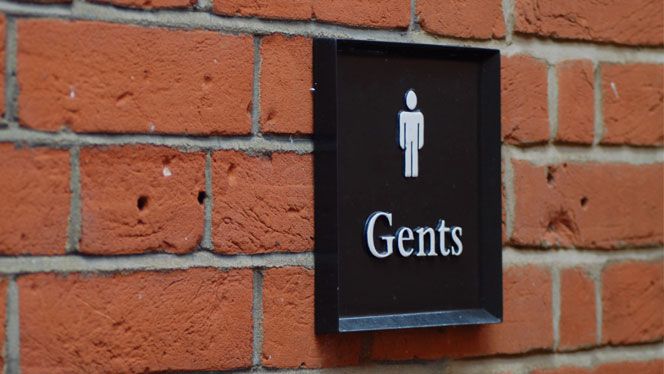Thoughts on living with an enlarged prostate

Is your dad peeing often and little? Maybe painfully? It might not be cancer, but it might be an enlarged prostate. Here are some thoughts from our own experiences on what you can expect to happen once you’ve persuaded them to see a doctor.
At the beginning of 2013 comedian Bill Bailey fronted a campaign to highlight the issue of prostate cancer.
For many of us with ageing parents, problems with prostates aren’t just about cancer. As men age, their prostates enlarge, often to the point that pressure on the urinary tract means that peeing naturally becomes impossible. About 60% of men over 60 suffer some degree of prostate enlargement, and as people live longer, this becomes a more widespread and recurring problem.
Prostate enlargement may not be as serious a threat to health as cancer, but it can be a pretty painful and worrying one.
Older men with prostate problems become recognisable in A&E. They’ll be grey and drawn, lying on the bed trying not to grasp at the painful area. When the curtain closes you’ll hear grunts, followed by a short burst of pain, and then relief and gratitude. That’s the catheter going in – painful if you don’t have a nurse with some expertise – and then the release of urine from an over-full bladder.
The chances are that catheters will be inserted in hospital while district nurses will be called upon to help with changing bags regularly in the home. Your father should be shown how to empty the bag himself.
As with many things, different nurses will have learned different techniques, and that applies to attaching a catheter bag to a patient too. It’s worth checking that the catheter has been set up to allow your relative some ease of movement. If the tube is taken down the leg and the tap is taped around the ankle, that’s going to make walking and emptying the bag that much easier than if it’s higher up around the thigh. It’s a good discussion to have with the nurse if you’re there.
Waiting for any length of time for treatment can mean living with a catheter. As it’s inserted into a very sensitive area, your parent is likely to be in discomfort for some time. The longer a catheter is used, the more chance there is of a urinary tract infection to cause even more pain. Infection also causes confusion, and one of the things confused people do is remove their catheter, which can mean a trip to A&E to have it replaced. It’s a good idea to keep a check on any signs of confusion and get a urine test carried out by the local surgery, which can also prescribe specific antibiotics to address the problem.
While a catheter is a short-term solution, there are longer-term treatments that can help.
The first step in our experience is to take out the catheter and see if the patient can start to pee again by themselves. Without having undergone any treatment this seems unlikely. Your parent will probably be sent home if they’re not already there to try out life without a catheter. If it gets too painful, they’ll almost certainly be taken back to hospital for reinsertion.
If your father or other relative has been suffering from a slowly growing prostate over time, he may have taken to minimising his intake of fluids. Being able to judge whether his system is now working well may take more than a few hours, and sometimes in our experience medical staff are over-eager to reinsert the catheter on the basis that nothing much has been produced.
If the prostate has not sorted itself out naturally, there are a number of courses of action.
The NHS offers treatments in the form of lifestyle advice, medication, some surgery options and possible laser treatment. If you’re willing to pay, private medicine offers a wide range of treatments. These may not be a permanent solution.
Whichever course of action your parent chooses there is every likelihood that the prostate will start to grow again and further treatment will be needed 15 years or so down the line.
Of course, to start treatment your relative has to admit there’s a problem, be convinced that he won’t be a nuisance if he goes to the doctor, and must get some good medical advice. Once he knows if it’s his prostate or another issue, then you can take it from there.
Do you recognise our experience, or has yours been quite different? What has helped your relative to manage prostate problems? Let us know with a comment below.

